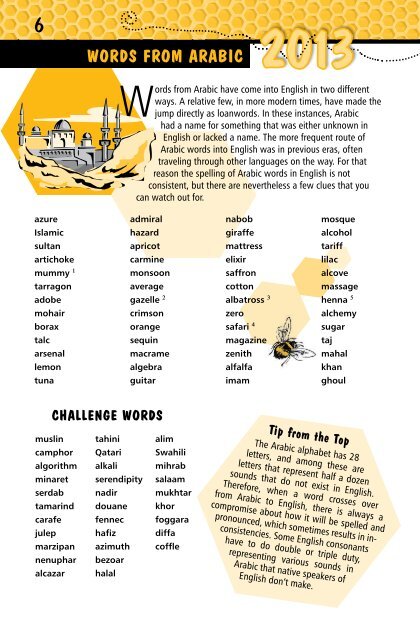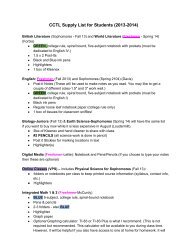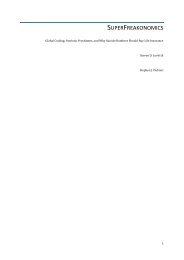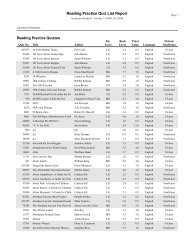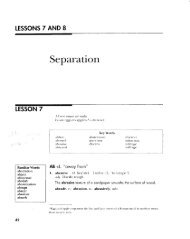Spell It!
Spell It!
Spell It!
Create successful ePaper yourself
Turn your PDF publications into a flip-book with our unique Google optimized e-Paper software.
6 7<br />
azure<br />
Islamic<br />
sultan<br />
artichoke<br />
mummy 1<br />
tarragon<br />
adobe<br />
mohair<br />
borax<br />
talc<br />
arsenal<br />
lemon<br />
tuna<br />
chALLenGe WordS<br />
muslin<br />
camphor<br />
algorithm<br />
minaret<br />
serdab<br />
tamarind<br />
carafe<br />
julep<br />
marzipan<br />
nenuphar<br />
alcazar<br />
Words from Arabic have come into English in two different<br />
ways. A relative few, in more modern times, have made the<br />
jump directly as loanwords. In these instances, Arabic<br />
had a name for something that was either unknown in<br />
English or lacked a name. The more frequent route of<br />
Arabic words into English was in previous eras, often<br />
traveling through other languages on the way. For that<br />
reason the spelling of Arabic words in English is not<br />
consistent, but there are nevertheless a few clues that you<br />
can watch out for.<br />
tahini<br />
Qatari<br />
alkali<br />
serendipity<br />
nadir<br />
douane<br />
fennec<br />
hafiz<br />
azimuth<br />
bezoar<br />
halal<br />
admiral<br />
hazard<br />
apricot<br />
carmine<br />
monsoon<br />
average<br />
gazelle 2<br />
crimson<br />
orange<br />
sequin<br />
macrame<br />
algebra<br />
guitar<br />
alim<br />
Swahili<br />
mihrab<br />
salaam<br />
mukhtar<br />
khor<br />
foggara<br />
diffa<br />
coffle<br />
nabob<br />
giraffe<br />
mattress<br />
elixir<br />
saffron<br />
cotton<br />
albatross 3<br />
zero<br />
safari 4<br />
magazine<br />
zenith<br />
alfalfa<br />
imam<br />
2013<br />
WordS from ArAbIc WordS from ArAbIc<br />
mosque<br />
alcohol<br />
tariff<br />
lilac<br />
alcove<br />
massage<br />
henna 5<br />
alchemy<br />
sugar<br />
taj<br />
mahal<br />
khan<br />
ghoul<br />
tip from the top<br />
The Arabic alphabet has 28<br />
letters, and among these are<br />
letters that represent half a dozen<br />
sounds that do not exist in English.<br />
Therefore, when a word crosses over<br />
from Arabic to English, there is always a<br />
compromise about how it will be spelled and<br />
pronounced, which sometimes results in inconsistencies.<br />
Some English consonants<br />
have to do double or triple duty,<br />
representing various sounds in<br />
Arabic that native speakers of<br />
English don’t make.<br />
SpeLLInG tIpS for WordS from ArAbIc<br />
1 Double consonants are often seen in words from Arabic.<br />
More often than not, they occur in the middle of a word<br />
as in mummy, cotton, henna, foggara, coffle, tarragon,<br />
and several other words on the list. Their appearance at the<br />
end of a word (as in albatross and tariff ) is usually because<br />
of the spelling conventions of English or some other<br />
language that the word passed through to get here.<br />
2 A typical word from Arabic has three consonant sounds, with<br />
or without vowels between them. Gazelle, safari, talc, carafe,<br />
mahal, tahini, alkali, hafiz, and salaam are typical examples.<br />
3 Note how many words on this list begin with al: This spelling can be traced to the<br />
definite article al (“the”) in Arabic, which sometimes gets borrowed along with a word.<br />
Most of the time the spelling is al in English, but note el in elixir.<br />
4 A long e sound (\\) at the end of a word from Arabic is often spelled with i as in<br />
safari and several other words on the list but may also be spelled with y as in mummy<br />
and alchemy.<br />
5 The schwa sound (\ə\) at the end<br />
of a word from Arabic is usually<br />
spelled with a as in henna,<br />
tuna, algebra, alfalfa,<br />
foggara, and diffa.<br />
noW You trY!<br />
folk etymology<br />
Is it just coincidence that mohair<br />
describes the hair of a goat? Not exactly.<br />
Mohair—like dozens of other words<br />
in this book—is the result of a process called<br />
“folk etymology.” Folk etymology sometimes occurs<br />
when a word travels from one language to another.<br />
Speakers of the new language (ordinary “folks”)<br />
often change the word in a way that makes it more like<br />
words in their language. To help them remember just what<br />
the word is, they might even change a part of it to match<br />
a word that is already familiar to them. The original<br />
Arabic for mohair is mukhayyar. The element hay-<br />
yar doesn’t mean “hair,” but its sound was close<br />
enough for English speakers to make the<br />
connection. Watch out for other words<br />
that you suspect might have elements<br />
of folk etymology in them!<br />
1. Elixir is typical of a word from Arabic in that it has three consonant sounds, not counting<br />
the sound of the letter l that is from the Arabic definite article (see tip 3, above).<br />
Why do you think elixir is spelled with only two consonants after the l in English?<br />
2. Arabic has three different letters, all with different sounds, that English speakers<br />
convert to a \k\ sound. How many different ways is \k\ spelled on the list of<br />
words from Arabic?


